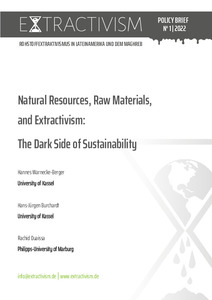| dc.contributor.author | Warnecke-Berger, Hannes | |
| dc.contributor.author | Burchardt, Hans-Jürgen | |
| dc.contributor.author | Ouaissa, Rachid | |
| dc.date.accessioned | 2023-05-16T09:12:20Z | |
| dc.date.available | 2023-05-16T09:12:20Z | |
| dc.date.issued | 2022 | |
| dc.identifier | doi:10.17170/kobra-202305168028 | |
| dc.identifier.uri | http://hdl.handle.net/123456789/14709 | |
| dc.description | Extractivism - The Project:
The collaborative research project extractivism.de links the Universities of Kassel and Marburg. The project scrutinizes the extractivist development model and proposes new economic, political, and sociological conceptions of extractivism. It preliminarily focuses on Latin America and the Maghreb patterns. The project researches the conditions under which these patterns affect the persistence and transformative capacity of extractivism and its respective institutional settings. Finally, it explores how extractivism affects cultural processes and habitual routines and questions under what conditions and how far the development model extends into institution-building and social practice, i.e., everyday life. The project aims to understand extractive societies not as deviants from the Western trajectory of development but in their own logic and their own particularities. The project, therefore, combines a strong empirical focus with theoretical work. It links both broad field research and data gathering of primary data and the qualitative and quantitative analysis of available secondary sources with a stringent transregional comparison. It develops methods in cross-area studies and investigates whether and why similar patterns of social change emerge in different areas and world regions despite significant cultural, social, or religious differences. Finally, the project intends to translate the findings for politics, society, and development cooperation. Please visit www.extractivism.de for further information. | eng |
| dc.language.iso | eng | |
| dc.rights | Attribution-NoDerivatives 4.0 International | |
| dc.rights.uri | https://creativecommons.org/licenses/by-nd/4.0/ | |
| dc.subject.ddc | 300 | |
| dc.subject.ddc | 320 | |
| dc.title | Natural Resources, Raw Materials, and Extractivism: The Dark Side of Sustainability | eng |
| dc.type | Working paper | |
| dcterms.abstract | • Extractivism is the dark side of sustainability
• raw materials and primary commodities are the backbones of the global economy
• extraction and export of raw materials lead to Extractivism understood as a development model
• Extractivism is persistent, prone to crisis, and affects domestic and international constellations | eng |
| dcterms.abstract | • Extraktivismus ist die Schattenseite der Nachhaltigkeit
• Rohstoffe sind das Rückgrat der Weltwirtschaft
• Die Extraktion und der Export von Rohstoffen führen zum Entwicklungsmodell
Extraktivismus
• Extraktivismus ist persistent und krisenanfällig und beeinflusst nationale und internationale Konstellationen | ger |
| dcterms.abstract | • l’extractivisme est le côté obscur de la soutenabilité
• les matières premières et les produits de base sont les piliers de l'économie mondiale
• l’extraction et l’exportation de matières premières conduisent à l'extractivisme en tant que modèle de développement.
• l’extractivisme est persistant, sujet à des crises, et affecte les constellations nationales et internationales | fre |
| dcterms.accessRights | open access | |
| dcterms.extent | 8 Seiten | |
| dc.subject.swd | Natürliche Ressourcen | ger |
| dc.subject.swd | Nachhaltigkeit | ger |
| dc.subject.swd | Energiewende | ger |
| dc.type.version | publishedVersion | |
| dcterms.source.series | Extractivism Policy Briefs | eng |
| dcterms.source.volume | No. 1/2022 | |
| kup.iskup | false | |


